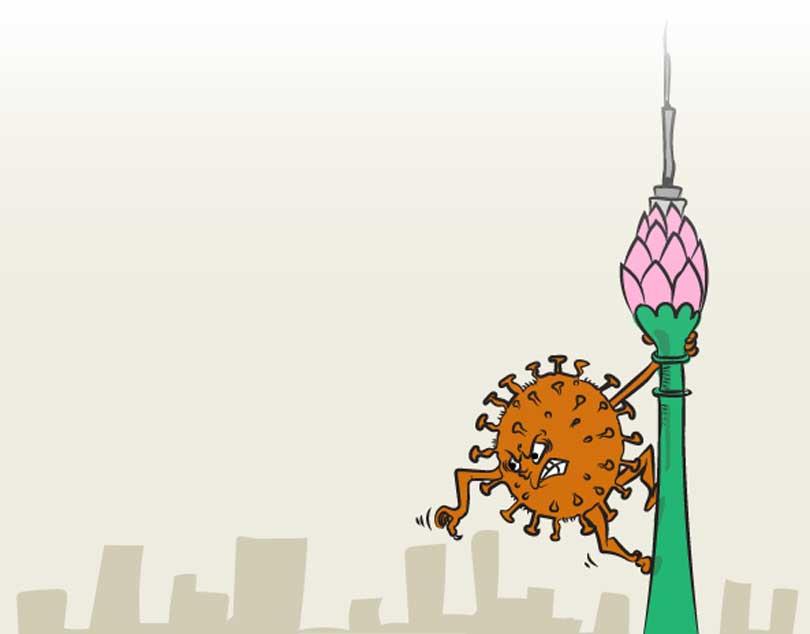01 Dec 2020 - {{hitsCtrl.values.hits}}

Two important and relevant personalities had expressed concern over the COVID-19 situation in Colombo. The city Mayor Rosy Senanayake in an interview with the Daily Mirror had stated that the situation was serious, pointing out a startling fact that results of 249 out of 991 PCR tests conducted on a day had been positive.
Meanwhile, according to another media report, the Public Health Inspectors (PHI) Union President, Upul Rohana had said that the pandemic situation in some areas of the capital city was out of control. He has cited that despite various containment measures being implemented, the spread of the virus and the death toll continue to rise in the Colombo Municipal limits.
Since the general public is not so concerned about statistics they do not seem to have been alarmed about the Colombo situation. But these numbers, when analyzed are extremely serious and terrifying. Earlier the Colombo Chief Medical Officer of Health (CMOH) Dr Ruwan Wijemuni, after conducting a series of random PCR tests in the city had said that there may be more than 30,000 people infected with COVID19 in the Capital city.
Dr Wijemuni told media that around 300 people in the city had been randomly selected for a PCR test and that 5 per cent of them had tested positive. According to the latest statistics given by the Mayor the situation is far more alarming as the percentage of the positivity of tests has risen to 25 per cent.
With Colombo being the transport and wholesale trade hubs for the entire country the danger it poses to the other areas of the country could not be ignored. On the other hand, the population density in the city coupled with the seeming exhaustion of the individuals and institutions that have been involved in the containment of the deadly disease since March demands new approaches and strategies in the combat against the Coronavirus threat.
The Mayor says that 60 per cent of the people who live in Colombo were underserved. They are the low-income groups and most of them live on daily wages or they have their self-employment schemes, she says. It is against this backdrop that we have to see the recent agitations of people in the locked-down areas in Colombo, demanding essential items or to allow them to earn a living.
This is a precarious situation for the government and the city authorities. Many of these people are neither monthly wage earners nor businessmen who have a buffer saving that would help them to face this kind of situations. On the other hand, it is these areas that are high-risk localities in respect of epidemics. Most of them live in flats and shanty areas which are generally called gardens by them and have a high density of population.
Many of the houses in these areas are very small but sometimes give shelter to several families. It is extremely difficult to expect them to adhere to the health instructions such as social distancing, hand washing and wearing masks all the time. The social bond between these families is very high due to them closely living in these localities and many of them being extended families. Once a measure such as a lockdown is implemented in these areas the outward movement stops, increasing the internal movements which inevitably would heighten the spread
of the epidemic.
The population density and the lack of accessibility to medical facilities due to lockdowns coupled with the hesitation to seek medical assistance for fear of being tested positive for the virus seems to have increased the COVID-19 related deaths at home as well in Colombo.
The Mayor had earlier suggested a total lockdown in the city with measures to address the basic needs of these people for two weeks or three weeks. Despite it seems to be a good suggestion government did not take interest apparently due to the financial constraint that it is faced with. The PHI union is also highly concerned about the functioning of the government and private institutions in areas currently under isolation. They have also insisted on adherence of health guidelines in these institutions while expressing special concerns over operations in the port. However, the country cannot afford a closure of some institutions which could result in the breakdown of essential services.
The people and the government must understand each other. While the authorities must understand the plight of the people without insulting them for spending within a week the Rs. 5000 doled out to them while the people must understand the severity of the situation. As the Mayor told in her interview everybody must shed the mindset of “it is not going to happen to me.
30 Nov 2024 1 hours ago
30 Nov 2024 4 hours ago
30 Nov 2024 6 hours ago
30 Nov 2024 7 hours ago
29 Nov 2024 29 Nov 2024